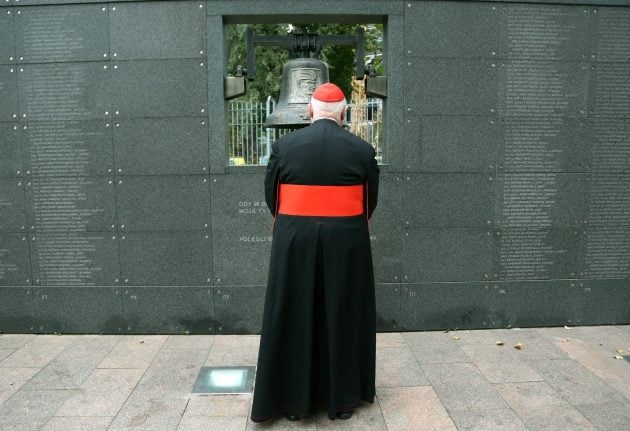The four-day episcopal gathering in the western city of Mainz comes at a time of fierce debate about how to modernise Germany's Catholic Church, pitting conservative bishops against more progressive ones.
Cardinal Reinhard Marx, a driving force behind efforts to renew the under-fire Church, last month unexpectedly announced he would not seek another six-year term as head of the German Bishops' Conference, saying he was too old at 66.
READ ALSO: Six things to know about Catholicism in Germany
The several dozen bishops attending the annual general assembly will choose his successor in a secret vote on Tuesday, although no clear frontrunner has emerged.
Besides confronting calls to relax the rules on priestly celibacy and the roles of women in the clergy, the new chairman will have to deal with the Church's sexual abuse legacy.
Stephan Ackermann, the bishop charged with addressing the historic child abuse scandal, recently said he expected a decision “in the coming months” about financial compensation for survivors.
'Not a handout'
More than a decade after the first abuse revelations emerged in Germany, victims are losing patience.
“There's no reason to wait any longer,” the Eckiger Tisch victims' group said, calling for a resolution this year.
The group has proposed a one-off sum of around 300,000 euros per person, or the creation of a fund paid for by the Church but run by independent overseers.
Several high-ranking Church officials have rejected the proposals as too costly.

Left to right: Matthias Katsch, an activist for child victims of sexual abuse, Johannes-Wilhelm Rörig, a senior public administrator, Caroline Link, a film director, and Silke Noack, the head of the sexual abuse help line, give a press conference in January 2020. Photo: DPA
A study commissioned by the German Bishops' Conference and released in 2018 showed that 1,670 clergymen had committed some form of sexual attack against 3,677 minors, mostly boys, between 1946 and 2014.
The revelations, which mirror paedophile scandals in Australia, Chile, France, Ireland and the United States, prompted Cardinal Marx to apologize on behalf of the German Catholic Church.
The Church currently pays victims an average sum of €5,000 “in recognition of their suffering”, as well as covering their therapy fees.
“Recognising the suffering is not enough,” the Eckiger Tisch said ahead of the episcopal gathering, adding that victims were not asking for “a handout”.
Celibacy, women's roles
At 23 million followers, the Catholic Church remains Germany's biggest religious community. But its pews are increasingly empty on Sundays, and it is struggling to recruit new priests.
Hoping to renew itself and regain the public's trust after the abuse scandals, the German Church recently embarked on two years of discussions tackling the institution's most controversial themes, including the child abuse crisis.
The so-called synodal path will also debate whether to end celibacy and allow priests to marry, and whether women should be ordained.
Traditionalists within the Church have already voiced their opposition to such changes, chief among the influential Cardinal Rainer Maria Woelki of Cologne.
Critics of the reform push also say such decisions should come from the Vatican, and not from Catholic leaders in Germany.
Pope Francis recently disappointed progressives by rejecting a proposal to allow married men to become priests in remote Amazon regions to tackle an urgent shortage of clerics.
He also stopped short of allowing women to be ordained as deacons in the region, instead calling for women and lay people to take on greater roles.
One of the candidates tipped as a potential successor as the leader of Germany's Catholics, Bishop Franz-Josef Overbeck of Essen, used his New Year's sermon to urge the 2,000-year-old Church to choose “a fresh start”.
The limitations placed on women in the Church are “increasingly inacceptable” to many people, he warned, while “quite a few priests” find celibacy “a heavy burden”.



 Please whitelist us to continue reading.
Please whitelist us to continue reading.
Member comments